[ad_1]
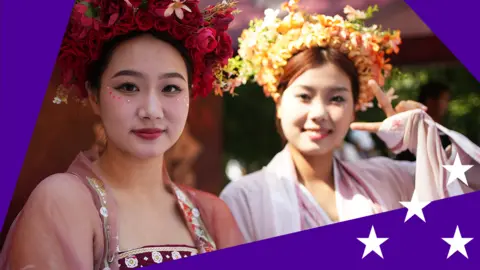 BBC
BBCIn China, people are following the US election with keen interest and some anxiety. They fear that whoever wins the White House could have an impact on several aspects of life – at home and abroad.
“None of us wants to see a war,” says Mr Xiang, as the music in the park reaches a crescendo and a nearby dancer elegantly spins his partner.
He has come to Ritan Park to learn dance with other seniors.
They gather here regularly, just a few hundred metres from the Beijing home of the American ambassador in China.
In addition to new dance moves, the looming US election is also on their minds.
It comes at a pivotal time between the two superpowers, with tensions over Taiwan, trade and international affairs running high.
“I am worried that Sino-US relations are getting tense,” says Mr Xiang who’s in his sixties. Peace is what we want, he adds.
A crowd has gathered to listen to this conversation. Most are reluctant to give their full names in a country where it is permissible to talk about the US president, but being critical of their own leader could get them in trouble.
They say they are worried about war – not just about a conflict between Washington and Beijing but an escalation of current wars in the Middle East and Ukraine.
That is why Mr Meng, in his 70s, hopes Donald Trump will win the election.
“Although he imposes economic sanctions on China, he does not wish to start or fight a war. Mr Biden starts more wars so more ordinary people dislike him. It is Mr Biden who supports Ukraine’s war and both Russia and Ukraine suffer great loss from the war,” he said.
Some sisters recording a dance routine for their social media page chip in. “Donald Trump said in the debate that he will end the war in Ukraine 24 hours after he takes office,” says one.
“About Harris, I know little about her, we think she follows the same route as President Biden who supports war.”
Their opinions echo a key message being propagated on Chinese state media.

China has called on the international community to negotiate a ceasefire in Gaza while aligning itself with what it describes as its “Arab brothers” in the Middle East and has been quick to blame the US for its unwavering support of Israel.
On Ukraine, Foreign Minister Wang Yi told the United Nations that China was playing a “constructive role” as he accused Washington of “exploiting the situation for selfish gain”.
While most analysts believe Beijing does not have a favourite in this race for the White House, many would agree that Kamala Harris is an unknown quantity to Chinese people and the country’s leaders.
But some believe she will be more stable than Trump when it comes to one of the biggest flashpoints between the US and China – Taiwan.
“I don’t like Trump. I don’t think there is a good future between the US and China – there are too many problems, the global economy, and also the Taiwan problem,” says a father of a four-year-old boy in the park for a family day out.
He fears their differences over Taiwan could eventually lead to conflict.
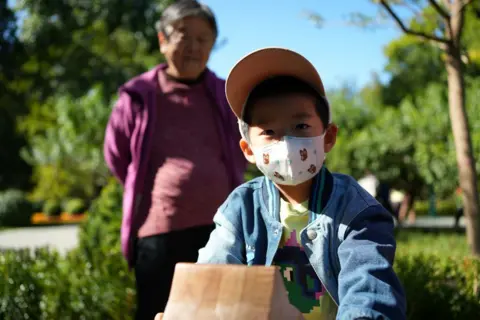
“I don’t want it. I don’t want my son to go to the military,” he says as the young boy pleads to go back on the slide.
China claims the self-governing island of Taiwan as its own and President Xi has said “reunification is inevitable”, vowing to retake it by force if necessary.
The US maintains official ties with Beijing and recognises it as the only Chinese government under its “One China policy” but it also remains Taiwan’s most significant international supporter.
Washington is bound by law to provide Taiwan with defensive weapons and Joe Biden has said that the US would defend Taiwan militarily, breaking with a stance known as strategic ambiguity.
Harris has not gone that far. Instead, when asked in a recent interview she stated a “commitment to security and prosperity for all nations.”
Donald Trump is instead focused on a deal – not diplomacy. He has called on Taiwan to pay for its protection.
“Taiwan took our chip business from us. I mean, how stupid are we? They’re immensely wealthy,” he said in a recent interview. “Taiwan should pay us for defence.”

One of their biggest worries when it comes to the former US president is that he has also made it clear he plans to impose 60% tariffs on Chinese goods.
This is the last thing many businesses in China want right now as the country is trying to manufacture enough goods to export itself out of an economic downturn.
Ministers in China bristle with contempt at US-led trade tariffs which were first imposed by Donald Trump.
President Biden has also levied tariffs, targeting Chinese electronic vehicles and solar panels. Beijing believes these moves are an attempt to curb its rise as a global economic power.
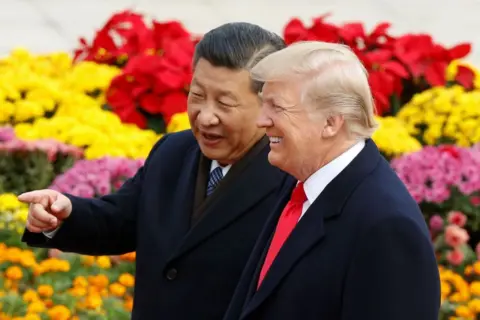 Getty Images
Getty Images“I don’t think it will do any good to the US to impose tariffs on China,” says Mr Xiang, echoing the sentiments of many we met. The tariffs will hit the US people, he adds, and increase costs for ordinary people.
Many of the the younger generation, while patriotic, also look towards the US for trends and culture – and that, perhaps more than any diplomatic mission, has power too.
In the park, Lily and Anna, aged 20 and 22, who get their news from TikTok, echo some of the national messages of pride spread by Chinese state media when it comes to this competitive relationship.
“Our country is a very prosperous and powerful country,” they say, dressed in their national costumes. They love China, they said, although they also adore the Avengers and particularly Captain America.
Taylor Swift is on their playlists too.
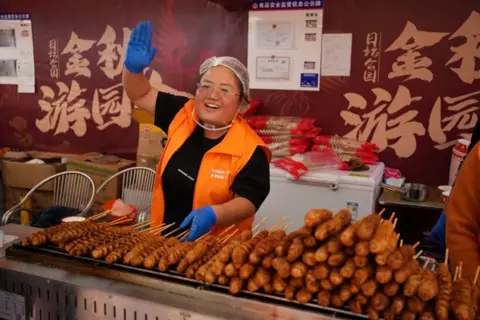
Others like 17-year-old Lucy hope to study in America one day.
As she cycles on an exercise bike, newly installed in the park, she dreams about visiting Universal Studios one day – after her graduation.
Lucy says she is excited to see there is a female candidate. “Harris’s candidacy marks an important step forward for gender equality, and it’s encouraging to see her as a presidential candidate.”
The People’s Republic of China has never had a female leader and not a single woman currently sits on the 24-member team known as the Politburo that makes up the most senior members of the Chinese Communist Party.
Lucy is also worried about the intense competition between the two countries and believes the best way for China and the Uned States to improve their relationship is to have more people-to-people exchangesit.
Both sides have vowed to work towards this, and yet the number of US students studying in China has fallen from around 15,000 in 2011 to 800.
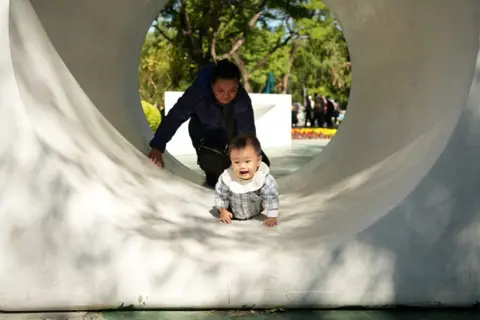
Xi hopes to open the door for 50,000 American students to come to China in the next five years. But in a recent interview with the BBC, the US ambassador to China, Nicholas Burns, accused parts of the Chinese government of not taking this pledge seriously.
He said that on dozens of occasions the security forces or a government ministry have prevented Chinese citizens from participating in public diplomacy run by the US.
On the other side, Chinese students and academics have reported being unfairly targeted by US border officials.
Lucy, however, remains optimistic that she will be able to travel to America one day, to promote Chinese culture. And, as the music strikes up nearby, she urges Americans to visit and experience China.
“We may be a little bit reserved sometimes and not as outgoing or as extrovert as US people, but we are welcoming,” she says as she heads off to join her family.
BBC photographs by Xiqing Wang

Between now and the US election on 5 November, BBC correspondents in other parts of the world will be exploring the impact its outcome could have where they are, and what people around the globe make of this White House race
[ad_2]
Source link freeslots dinogame telegram营销




